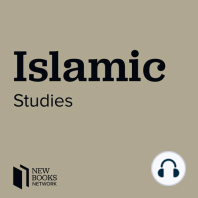62 min listen

Michel Boivin, "The Sufi Paradigm and the Makings of a Vernacular Knowledge in Colonial India" (Palgrave MacMillan, 2020)
Michel Boivin, "The Sufi Paradigm and the Makings of a Vernacular Knowledge in Colonial India" (Palgrave MacMillan, 2020)
ratings:
Length:
72 minutes
Released:
Nov 13, 2020
Format:
Podcast episode
Description
The Sufi Paradigm and the Makings of a Vernacular Knowledge in Colonial India: The Case of Sindh (1851-1929) (Palgrave Macmillan, 2020) by Michel Boivin maps the construction of a vernacular knowledge (as opposed to colonial knowledge) of a complex Sufi paradigm in Sindh by both British Orientalists, such as Richard Burton, but also Sindhi intelligentsia, like Mirza Qalich Beg. Examining the historical period from 1851-1929 during the British colonial control of the Sindh, the book argues that though the British were not interested directly in Sufism, their investment in learning languages (Sindhi) and culture, for administrative purposes, led to consequential engagement with Sufi literary traditions, especially the Shah jo Risalo by the Sindhi Sufi poet Shah Abd al-Latif. In tracing the lives of Sufi textual and print materials written by both Orientalists and indigenous Sindhi literati, Boivin captures the complex ways in which a Sindhi Sufi paradigm was constructed but also vernacularized, and how it was informed by Hinduism, Ismailism, and Sikhism, but also the mediums of the printing presses, libraries and bookshops. The book’s rich textual and historical analysis provides productive insights to how we can think about the formation of Sufism as a devotional regime of knowledge and how notions of Sufism were informed not only by mystical philosophies and religious practices by Sufis themselves, but also by colonialism, literary practices and social and economic realities.
Shobhana Xavier is an Assistant Professor of Religious Studies at Queen’s University. Her research areas are on contemporary Sufism in North America and South Asia. She is the author of Sacred Spaces and Transnational Networks in American Sufism (Bloombsury Press, 2018) and a co-author of Contemporary Sufism: Piety, Politics, and Popular Culture (Routledge, 2017). More details about her research and scholarship may be found here and here. She may be reached at shobhana.xavier@queensu.ca . You can follow her on Twitter via @shobhanaxavier
Learn more about your ad choices. Visit megaphone.fm/adchoices
Support our show by becoming a premium member! https://newbooksnetwork.supportingcast.fm/islamic-studies
Shobhana Xavier is an Assistant Professor of Religious Studies at Queen’s University. Her research areas are on contemporary Sufism in North America and South Asia. She is the author of Sacred Spaces and Transnational Networks in American Sufism (Bloombsury Press, 2018) and a co-author of Contemporary Sufism: Piety, Politics, and Popular Culture (Routledge, 2017). More details about her research and scholarship may be found here and here. She may be reached at shobhana.xavier@queensu.ca . You can follow her on Twitter via @shobhanaxavier
Learn more about your ad choices. Visit megaphone.fm/adchoices
Support our show by becoming a premium member! https://newbooksnetwork.supportingcast.fm/islamic-studies
Released:
Nov 13, 2020
Format:
Podcast episode
Titles in the series (100)
Lesley Hazleton, “After the Prophet: The Epic Story of the Shia-Sunni Split” (Doubleday, 2009): Sometimes a shallow explanation, the kind you read in newspapers and hear on television, is enough. “The home team was beaten at the buzzer” is probably all you need to know. Sometimes, however, it’s not. The intermittent conflict between the Shias and... by New Books in Islamic Studies